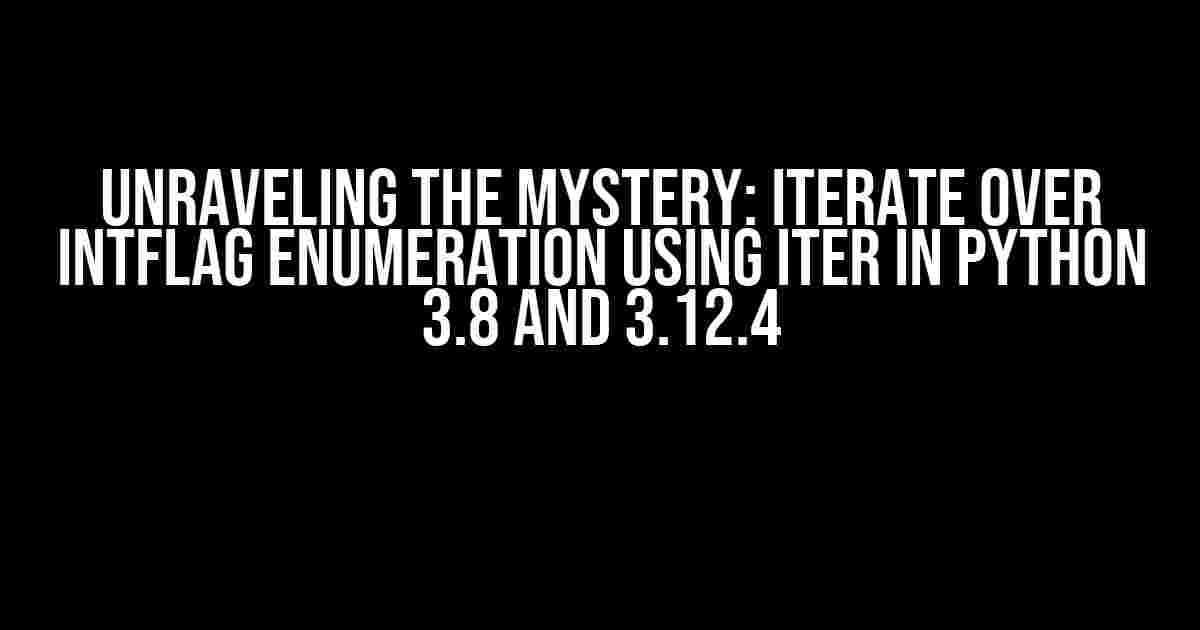Are you puzzled by the differences in iterating over IntFlag enumerations using the `iter` function in Python 3.8 and 3.12.4? You’re not alone! In this comprehensive guide, we’ll delve into the world of enumerations, `iter`, and the changes that have taken place between these two Python versions.
- The Basics: Enumerations and IntFlag
- The Difference: Iterate Over IntFlag Enumeration Using Iter in Python 3.8 and 3.12.4
- Conclusion: Iterate Over IntFlag Enumeration Using Iter in Python 3.8 and 3.12.4
- Best Practices: Iterate Over IntFlag Enumeration Using Iter
- Final Thoughts: Iterate Over IntFlag Enumeration Using Iter
The Basics: Enumerations and IntFlag
Before we dive into the meat of the matter, let’s quickly review the fundamentals. In Python, an enumeration is a set of symbolic names bound to unique, constant values. The `enum` module provides a way to create enumerations. One of the powerful features of enumerations is the ability to combine flags using the `IntFlag` class.
from enum import IntFlag, Enum
class Color(IntFlag):
RED = 1
GREEN = 2
BLUE = 4
print(Color.RED | Color.GREEN) # Output: Color(3)
The `iter` Function: A Brief Introduction
The `iter` function returns an iterator object that allows us to iterate over a sequence (such as a list, tuple, or string) or other iterable objects. In the context of enumerations, `iter` can be used to iterate over the members of an enumeration.
from enum import Enum
class Season(Enum):
SPRING = 1
SUMMER = 2
AUTUMN = 3
WINTER = 4
for season in iter(Season):
print(season) # Output: SPRING, SUMMER, AUTUMN, WINTER
The Difference: Iterate Over IntFlag Enumeration Using Iter in Python 3.8 and 3.12.4
Now, let’s get to the heart of the matter. In Python 3.8, when you use `iter` to iterate over an `IntFlag` enumeration, you’ll get a set of individual flags, not the combined flags. This is because `iter` returns an iterator over the unique values of the enumeration.
from enum import IntFlag
class Color(IntFlag):
RED = 1
GREEN = 2
BLUE = 4
for color in iter(Color):
print(color)
# Output:
# Color.RED
# Color.GREEN
# Color.BLUE
In Python 3.12.4, the behavior changes. `iter` now returns an iterator over all possible combinations of flags, not just the individual flags. This means you’ll get all possible combinations of flags, including the empty flag (0). Why is this? Well, it’s due to the way `enum` is implemented in Python 3.12.4.
from enum import IntFlag
class Color(IntFlag):
RED = 1
GREEN = 2
BLUE = 4
for color in iter(Color):
print(color)
# Output:
# Color(0)
# Color.RED
# Color.GREEN
# Color.RED|Color.GREEN
# Color.BLUE
# Color.RED|Color.BLUE
# Color.GREEN|Color.BLUE
# Color.RED|Color.GREEN|Color.BLUE
‘Understanding the Changes: A Deep Dive
So, what’s behind this change in behavior? To understand this, we need to dive deeper into the implementation of `enum` in Python. In Python 3.8, the `enum` module uses a simple iterator that yields the individual values of the enumeration. This is because the `__iter__` method of the `EnumMeta` class returns an iterator over the `_member_map_` dictionary, which contains the individual values of the enumeration.
class EnumMeta(type):
...
def __iter__(cls):
return iter(cls._member_map_.values())
In Python 3.12.4, the implementation of `enum` has changed. The `__iter__` method of the `EnumMeta` class now returns an iterator over all possible combinations of flags, not just the individual values. This is because the `_iterate_over_flags` function is used to generate all possible combinations of flags.
class EnumMeta(type):
...
def __iter__(cls):
return _iterate_over_flags(cls)
The `_iterate_over_flags` function uses bitwise operations to generate all possible combinations of flags. This means that it generates all possible combinations of flags, including the empty flag (0).
def _iterate_over_flags(enum_cls):
flags = [0]
for flag in enum_cls._member_map_.values():
flags.extend(flag | f for f in flags)
return iter(flags)
Conclusion: Iterate Over IntFlag Enumeration Using Iter in Python 3.8 and 3.12.4
In conclusion, iterating over an `IntFlag` enumeration using `iter` differs significantly between Python 3.8 and 3.12.4. While Python 3.8 returns an iterator over individual flags, Python 3.12.4 returns an iterator over all possible combinations of flags. Understanding these changes is crucial to writing robust and compatible code that works across different Python versions.
Best Practices: Iterate Over IntFlag Enumeration Using Iter
So, how can you ensure your code works correctly across different Python versions? Here are some best practices to keep in mind:
- Use `iter` with caution**: When iterating over an `IntFlag` enumeration, be aware of the differences in behavior between Python 3.8 and 3.12.4.
- Check the Python version**: If you need to iterate over an `IntFlag` enumeration, check the Python version using `sys.version_info` to ensure your code works correctly.
- Use explicit iteration**: Instead of relying on `iter`, use explicit iteration over the enumeration members using a list comprehension or a loop.
| Python Version | Iterate Over IntFlag Enumeration Using Iter |
|---|---|
| Python 3.8 | Returns individual flags |
| Python 3.12.4 | Returns all possible combinations of flags |
By following these best practices and understanding the changes between Python 3.8 and 3.12.4, you’ll be well-equipped to write robust and compatible code that works across different Python versions.
Final Thoughts: Iterate Over IntFlag Enumeration Using Iter
In this comprehensive guide, we’ve explored the differences in iterating over `IntFlag` enumerations using `iter` in Python 3.8 and 3.12.4. By grasping these changes and following best practices, you’ll be able to write more effective and compatible code. Remember,Stay curious, keep learning, and happy coding!
Frequently Asked Questions
Get ready to debunk the mysteries of iterating over IntFlag enumeration using iter in Python 3.8 and 3.12.4!
What’s the deal with iterating over IntFlag enumeration in Python 3.8?
In Python 3.8, when you iterate over an IntFlag enumeration using iter, it returns the individual flags, not the combined flags. This means you’ll get each flag separately, without any combinations. For example, if you have an enumeration with flags A=1, B=2, and C=4, iterating over it would give you A, B, C, but not A|B, A|C, or B|C.
What changed in Python 3.12.4 regarding iterating over IntFlag enumeration?
In Python 3.12.4, the behavior changed, and iterating over an IntFlag enumeration using iter now returns all possible combinations of flags. Using the same example as before, you would get A, B, C, A|B, A|C, B|C, and A|B|C. This change provides more flexibility and power when working with IntFlag enumerations.
Why did the behavior change between Python 3.8 and 3.12.4?
The change was made to provide more consistency with the expected behavior of enumerations and to make it easier to work with IntFlag enumerations. The new behavior allows for more intuitive and flexible iteration over the possible combinations of flags, making it easier to write concise and efficient code.
How can I get the old behavior in Python 3.12.4?
If you need to get the old behavior in Python 3.12.4, you can use the `iter(Foo.__members__.values())` syntax, where `Foo` is your IntFlag enumeration. This will give you the individual flags, without the combinations. Keep in mind that this might not be the recommended approach, as the new behavior is often more convenient and flexible.
What are some use cases where the new behavior is particularly useful?
The new behavior is particularly useful when you need to iterate over all possible combinations of flags, such as when working with permissions, feature flags, or bitmasked values. It allows you to write more concise and efficient code, and can simplify your logic when dealing with complex flag combinations.








